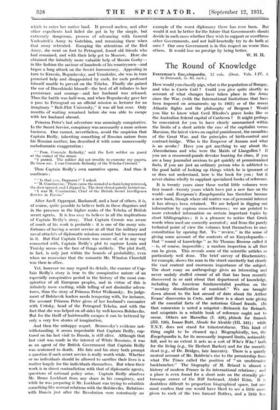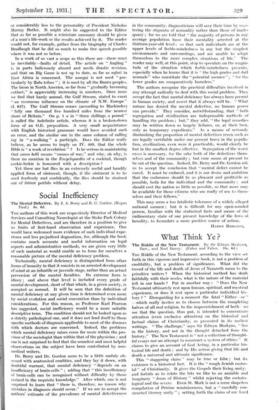The Round of Knowledge
How would you classify pigs, what is the population of Bungay, and who is Carrie Catt ? Could you give quite shortly an account of what changes have taken place in the Army since the War, (with the International limitations that have been imposed on armaments up to 1931) or of the recent Atlantic flights and the philosophy of Bergson ? Would you like to know what Cecil Rhodes's grave looks like or the Australian federal capital of Canberra ? It might perhaps be convenient for you to have clearly summarized within the limits of a short article the case of the capitalist versus Marxism, the latest views on capital punishment, the casualties of the Great War, and the principles of birth-control and contract-bridge. Who is the Emperor of Annam and what is an arroba ? Have you got anything to say about the Abecedarians and who were the Maids of Llangollen ? If you are a crossword-puzzle devotee hunting for clues, if you are a busy journalist anxious to get quickly at pemtnicanized facts, if you are just an ordinary person who is addicted to the good habit of looking up things which he is ignorant of or does not understand, here is the book for you ; but it never claims wholly to supplant specialized books of reference.
It is twenty years since these useful little volumes were first issued—twenty years which have put a new face on the
world—and Everyman's Encyclopaedia has therefore become
a new book, though where old matter was of perennial interest
it has always been retained. We are helped in digging out
information by copious cross-references ; we are pointed to more extended information on certain important topics by short bibliographies ; it is a pleasure to notice that Greek words when used are correctly accented ; and from the purely technical point of view the volumes lend themselves to easy consultation by opening flat. To review," in the sense of
giving some account of the contents of an Encyclopaedia—
that round of knowledge " as Sir Thomas Browne called it —is, of course, impossible ; a random inspection is all that can be given. This reveals some of the scientific articles as particularly well done. The brief survey of Biochemistry, for example, shows the man in the street succinctly but clearly the vast content and enormous importance of the subject.
The short essay on anthropology gives an interesting and
never unduly stuffed resume of all that has been recently
discovered in or said about that department of knowledge, including the American fundamentalist position on the
monkey demnification of mankind." We are brought down almost to the last second of date about Sir Arthur Evans' discoveries in Crete, and there is a short note giving all the essential facts of the notorious Glozel frauds. (In that connexion is noted a misprint—Reinarch for Reinaeh, and misprints in a reliable book of reference ought not to occur. Others are Marcellas (I. 428), phinok for finnock (III. 126), Issaac Butt, Alcade. for Alcalde (HI. 241) ; while T.N.T. does not stand for trinotrotoluene. This kind of thing ought to be cleaned up.) Biographically, too, the Encyclopaedia is, for its necessarily imposed limits, noticeably full, and to an extent it acts as a sort of Who's Who? both for the living (e.g., Sir Herbert Barker) and for the recently dead (e.g., of Dr. Bridges, late laureate). There is a quietly neutral account of Mr. Baldwin's rise to the premiership from what The Times called the position of " an unobtrusive backbencher." The biography of M. Briand is almost a history of modern France in its international relations ; and a place is even found for a short note on the stormily pic- turesque career of the Riff firebrand, Abdel Krim. It is doubtless difficult to proportion biographical space, but one must confess: that one would have liked to see' a little more given to each of the two Samuel Butlers, and a little less
or considerably less to the personality of President Nicholas Murray Butler. It might also be suggested to the Editor that as far as possible a miniature summary should be given of a man's life-work or the results achieved by it. The reader would not, for example, gather from the biography of Charles Bradlaugh that he did so much to make free speech possible where it was not so before.
In a work of so vast a scope as this there are—there must be inevitably—faults of detail. The article on " Angling " is in parts ludicrously absurd and needs drastic revision, and that on Big Game is not up to date, as far as safari in East Africa is concerned. The assegai is not used " par- ticularly by Zulu tribes " ; it is used by all the Bantu peoples. The bison in North America, so far from " gradually becoming extinct," is appreciably increasing in numbers. Once more we find that hardy annual, the Gulf Stream, stated to exert " an enormous influence on the climate of N.W. Europe" (I. 647). The Gulf Stream ceases (according to Mackinder) fully one thousand five hundred miles from the nearest shore of Britain." On p. 1 a in " three shillings a pound " is called the indefinite article, whereas it is a broken-down form of an O.E. preposition. A very small acquaintance with English historical grammar would have avoided such an error, and the similar one in the same column of calling ing in " a-walking" a participle. Does the Editor really believe, as he seems to imply on IV. 489, that the whole Bible is " a work of revelation " ? Is he serious in maintaining that cases belli means "causes of war," and why, oh why, is there no mention in the Encyclopaedia of a cocktail, though cookie-leekie is honoured with a description ?
Yet these are but flies in an extremely useful and handily applied form of ointment, though, if the ointment is to be used fearlessly and confidently, the flies should be strained out of future potfuls without delay.































 Previous page
Previous page